Educational Videos
It's Important to Test Your Child for Lead
Preventing Childhood Lead Exposures
Lowering Blood Lead Levels with Good Hygiene and Proper Nutrition
Repairing Residential Lead Based Paint Hazards
Lead Exposure Risk Model
Childhood Lead Program Video Training Modules
The following video training modules provide a general overview of topics related to lead poisoning prevention in Iowa. Each module contains educational information related to a specific topic on lead, followed by a short quiz to test your knowledge, and a training certificate. Training modules were developed to provide information to the general public, medical providers, public health professionals, child health service organizations, and anyone interested in learning more about lead poisoning prevention programs and services in Iowa.
The training modules are a collaborative effort between the Iowa Childhood Lead Poisoning Prevention Program and the Iowa Institute of Public Health Research and Policy at the University of Iowa.
Click here to start an online training session or click on one of the modules below.
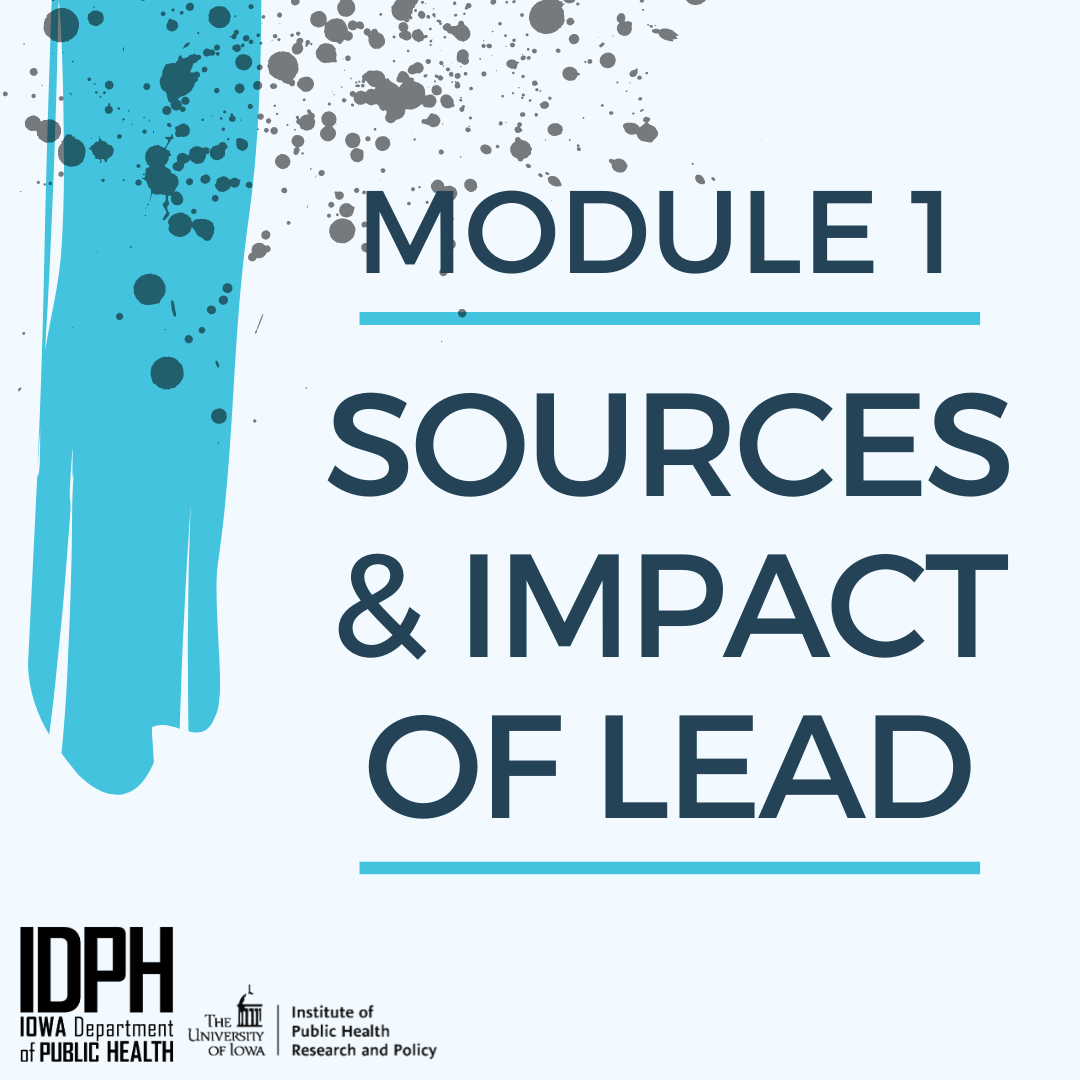
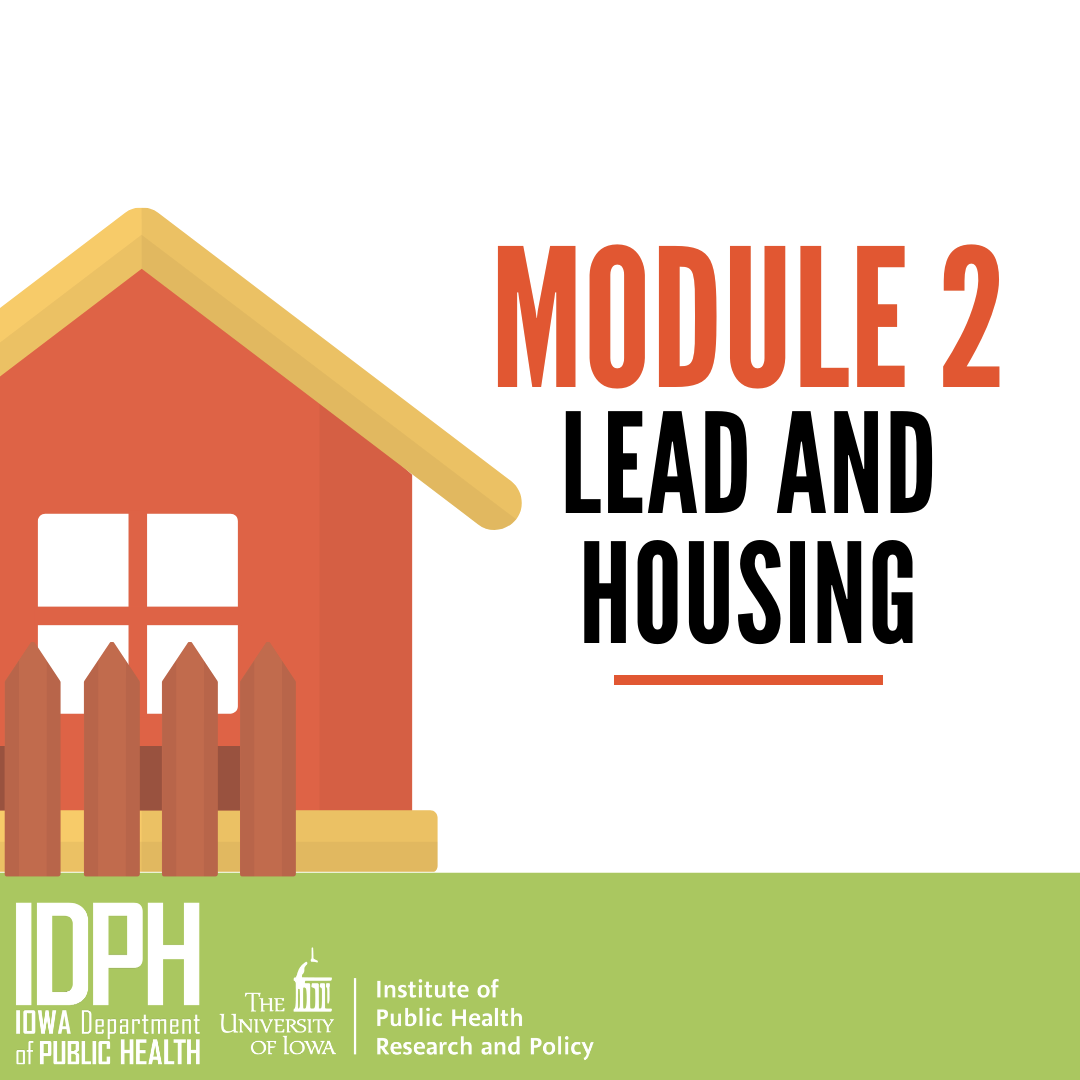
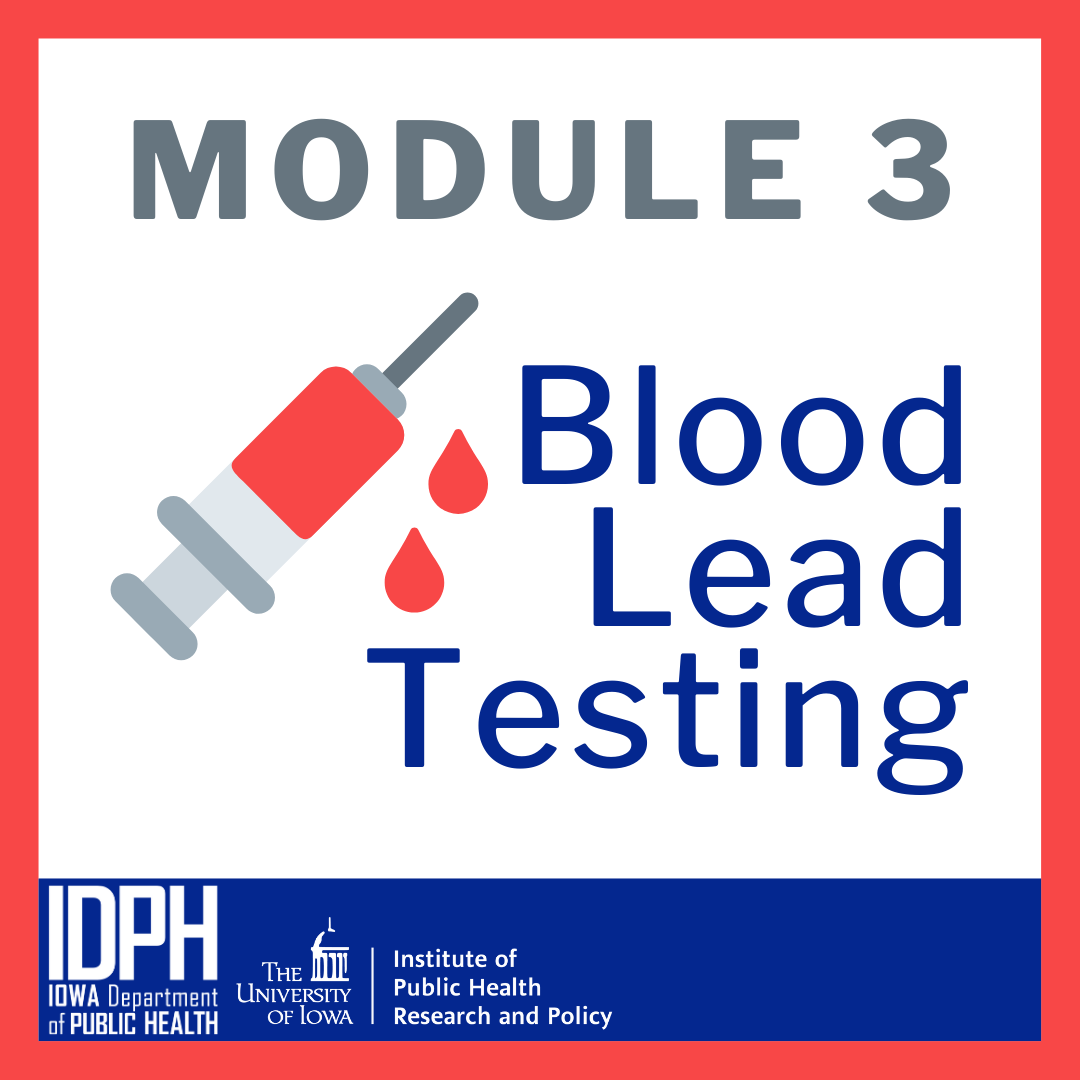
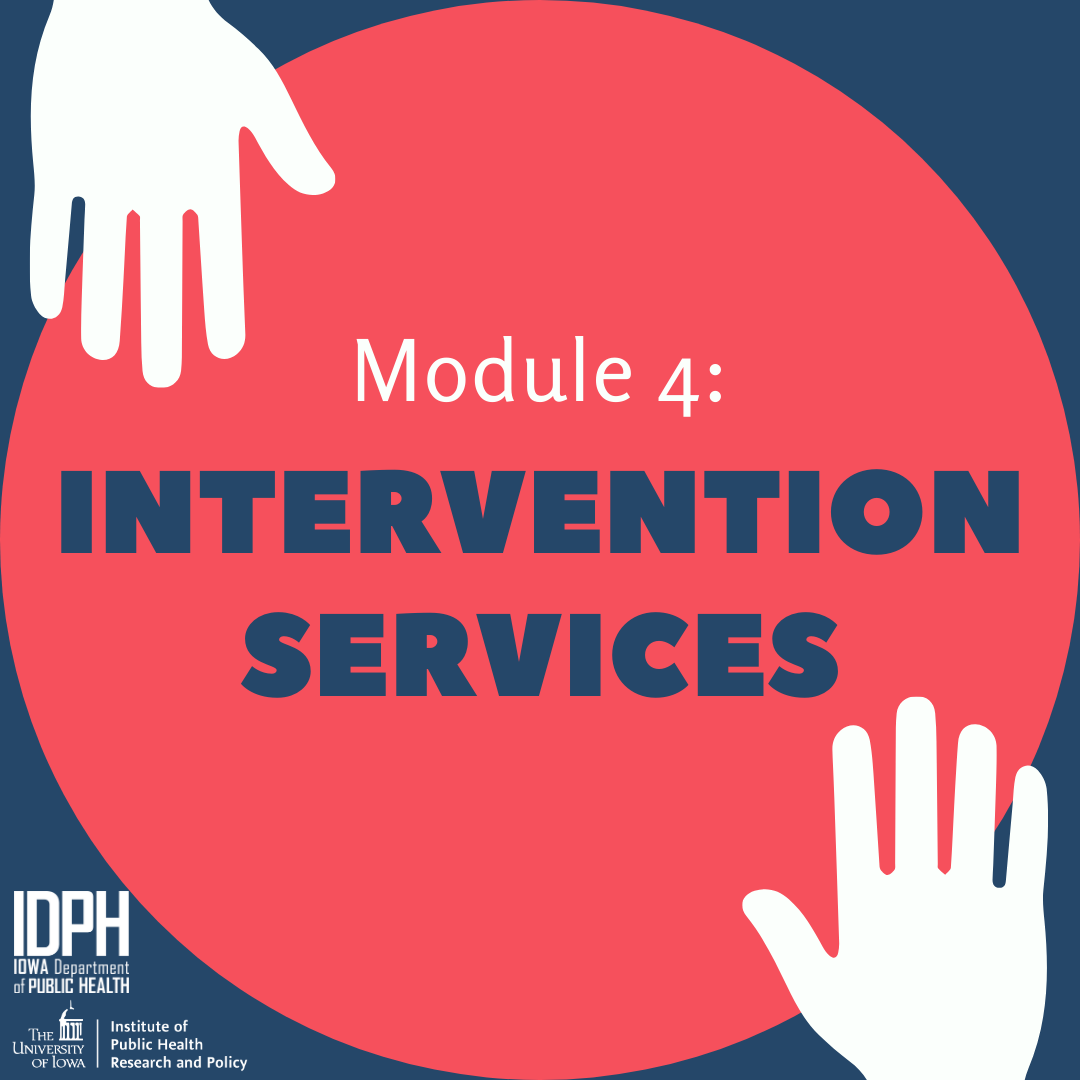
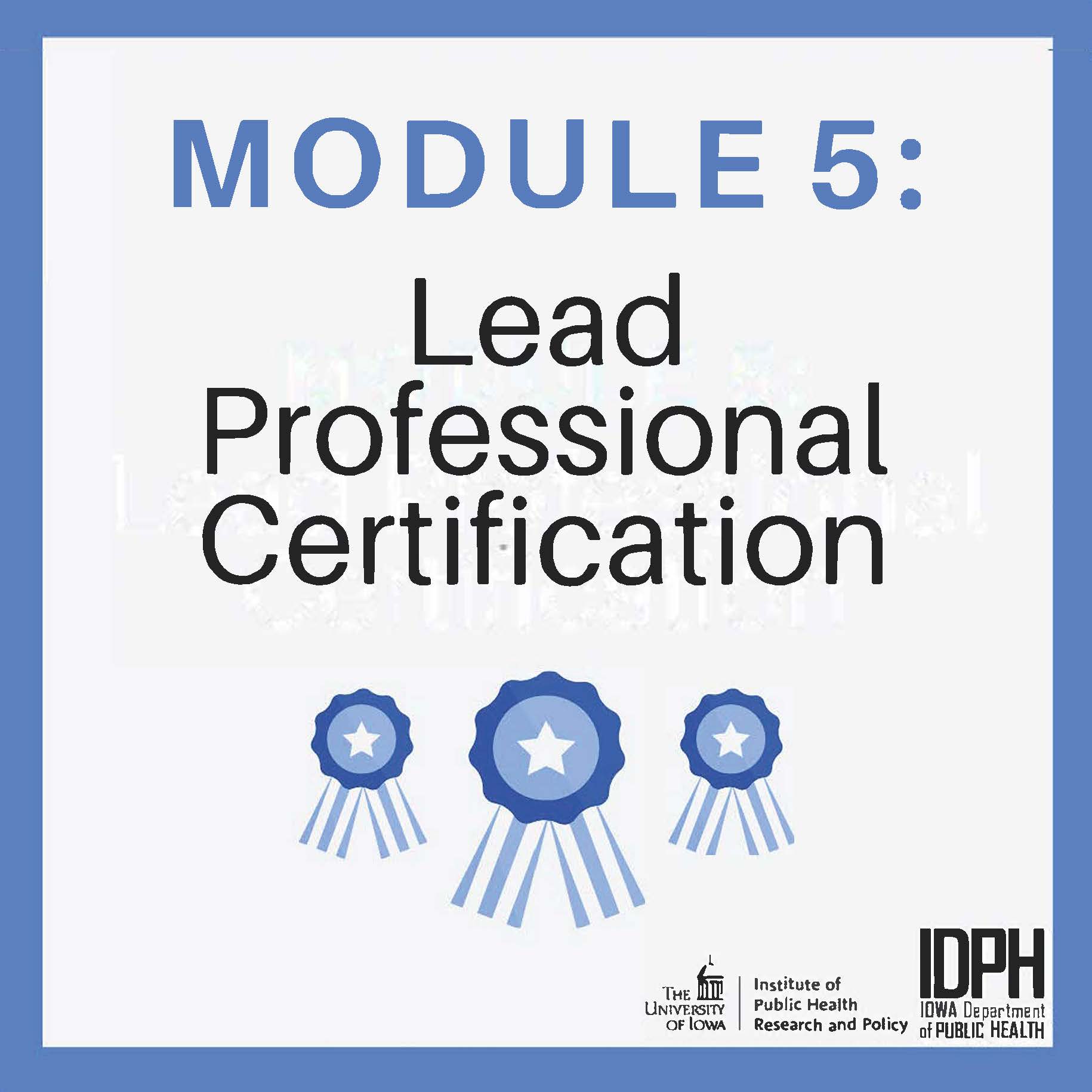
^ Back to top
Education & Outreach Materials
English
Articles
Spanish
National Lead Poisoning Prevention Week
October 23 - 29, 2022
National Lead Poisoning Prevention Week (NLPPW) begins October 23rd and we have provided educational information and materials for you to help us spread the message and increase awareness about preventing lead poisoning in your communities. The National Lead Poisoning Prevention Week Partner Information Kit is a tool to help partners prepare and promote activities at the local level. It contains information on messaging, implementation ideas, and resources.
Iowa's Lead Poisoning Prevention Week Toolkit materials can be used during NLPPW 2022 and throughout the year. The social media messages in the toolkit are in alignment with national daily themes and messages developed by CDC, HUD, and EPA. The toolkit also contains social media messages with images that can be copied and pasted to Facebook, Twitter, or Instagram. The guide also provides instructions on how to post the messages.
Throughout the week CDC, HUD, and EPA provide a webinar series for a diverse group of professionals to learn more about what they can do in their communities to raise awareness and prevent lead poisoning. A link to the NLPPW webinar series and schedule is provided below. Registration is limited, so please plan on registering early.
Childhood Lead Program Meetings & Presentations
March 2, 2021 - Childhood Lead Poisoning Prevention Program Meeting
October 14, 2020 - IEHA Virtual Conference
Zip Code Matters: Childhood Lead Poisoning Prevention – Let’s Look at the Root Cause
- Presentation slides
- Presentation Materials:
Learning Collaborative on Childhood Lead Poisoning Prevention
August 25, 2021
August 5, 2020
^ Back to top
Childhood Lead Program Guidelines & Recommendations
NEW - Updated Screening Tool and Blood Lead Testing Recommendations for Children 12 and 24 Months of Age:
IDPH recommends all medical providers, pediatricians, and public health professionals conducting blood lead screening and testing on children under 6 years in age begin using the updated screening tool and implementing the new blood lead testing guidelines within their practices.
Additional Resources
State Hygienic Lab Blood Lead Analysis Guidelines & Testing Supplies
IDPH recommends medical providers and clinicians continue testing children during the LeadCare test kit recall and supply shortage. The Iowa State Hygienic Lab (SHL) in Ankeny, Iowa has provided the following guidelines and testing supply forms for LeadCare II users. Visit the CDC for additional information and updates on the LeadCare test kit recall.
^ Back to top
Lead Laws and Codes
^ Back to top
Lead Professional Certification
^ Back to top
Additional Resources & Information
Toxic Effects of Lead Posters
The Toxic Effects of Lead on Children poster uses simple visual and text content to educate on the impacts of lead poisoning to a child's health and develpoment. The printed poster is 24" x 36" in size and can be displayed on walls or doors in pediatric or provider offices, schools, daycares, head start program facilities, and public health buildings. Posters can also be downloaded and used for social media, presentations, or posting online. The Toxic Effects of Lead on Children poster is currently available in English and Spanish.
For questions or information on obtaining printed posters email Kevin Officer at kevin.officer@idph.iowa.gov.
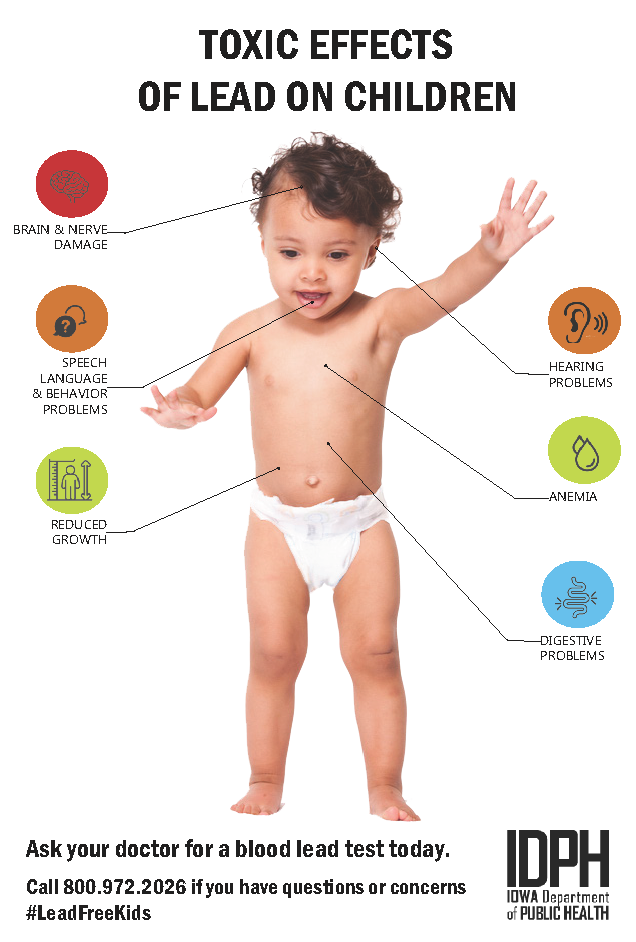
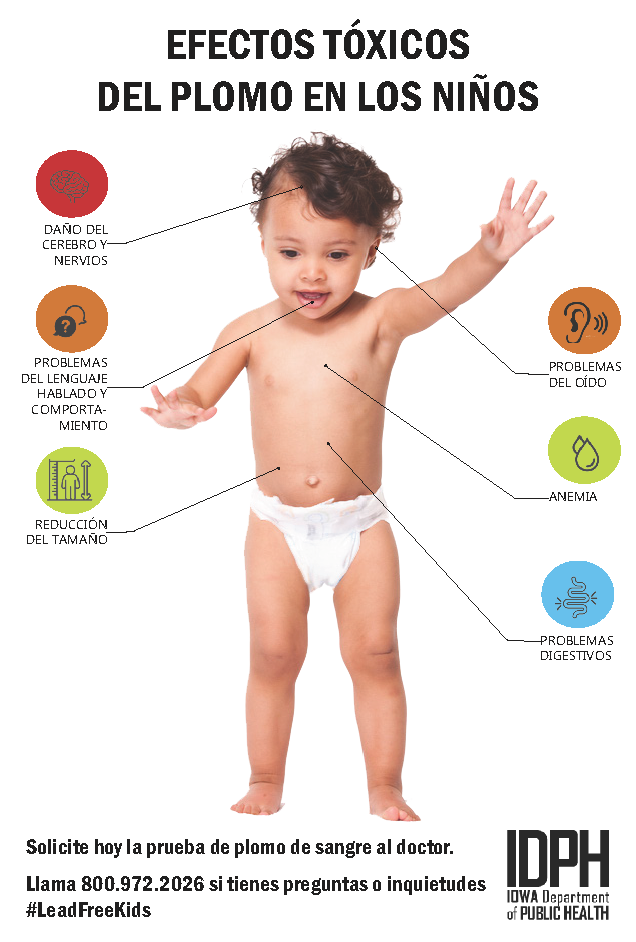
2020 Iowa County Lead Report Cards
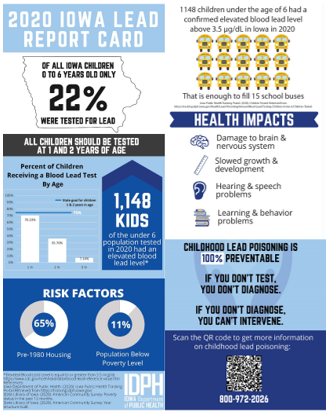
In 2020, Iowa tested 3% fewer children under 6 years of age for a statewide testing rate of 22 percent, compared to 25 percent in 2019. Similar decreases in the rate of testing occurred in children 2 and 3 years of age, while testing rates of children 1 year in age increased from 68 percent to 70 percent. Statewide blood lead testing rates continued to fall below the below the state goal of 75 percent for children 1 and 2 years in age.
County lead report cards provide blood lead testing rates and lead risk factor information on all 99 counties and the state as a whole. Each report card includes key data points on the front and educational information about the effects of lead poisoning on the back. Report cards for each county can be printed and handed out to medical providers, clinicians, local public health officials, and other child health service providers as a way to increase awareness about the health impacts of lead poisoning on children.
The 2020 Iowa county lead report cards were developed in collaboration with the Iowa Childhood Lead Advisory Workgroup (CLAW), Iowa Institute of Public Health Research and Policy, and the Iowa Childhood Lead Poisoning Prevention Program.
Click here to download a copy of the 2020 Iowa County Lead Report Card. Instructions for finding and printing your county’s report card can be found on page 2.
Iowa Childhood Lead Advisory Workgroup (CLAW)
The Iowa Department of Public Health (IDPH), Childhood Lead Poisoning Prevention Program (CLPPP) and the Iowa Institute of Public Health Research and Policy (IIPHRP) have collaborated to form a statewide workgroup to facilitate improved outreach, education, and program changes to prevent childhood lead poisoning in Iowa. The Childhood Lead Advisory Workgroup (CLAW) members include local housing officials, medical professionals, public health officials, elected officials as well as other child health and housing services professionals. The group, formed in 2020, develops comprehensive strategies to prevent childhood lead poisoning through statewide policy and program changes.
Activities and Reports
2022
- February 14, 2022 Lead & Housing Policy Meeting
- February 7, 2022 Blood Lead Testing Policy & Training Meeting
- January 20, 2022 CLAW Meeting
2021
2020
Additional Resources
Where can I get more information on preventing lead poisoning?
Iowa Department of Public Health
Call for current information about lead poisoning prevention in Iowa. Toll-free: 800-972-2026
Hearing impaired, call Relay Iowa 800-735-2942 or Fax: 515-281-4529
Contact your city or county lead program, health department, or housing agency for local rules on lead-based paint activities.
Iowa Housing and Urban Development (HUD)
Steve Eggleston, Field Office Director
Des Moines Field Office
U.S. Department of Housing and Urban Development
210 Walnut Street, Room 937
Des Moines Iowa 50309
Office: (515) 323-2462
Cell: (720) 219-9495
Fax: (515) 284-4743
Lead Reduction Grant Program Outreach and Marketing Tool 
Lead Hazard Reduction and Healthy Homes grant programs 
National Lead Information Center Clearinghouse
The National Lead Information Center can provide a variety of resource materials, including the following guides to lead-safe work practices.
- Steps to Lead Safe Renovation, Repair and Painting
- Protect Your Family from Lead in Your Home
- Lead in Your Home: A Parent’s Reference Guide
These materials are available by calling 800-424-LEAD (5323) or online at epa.gov/lead/documents-and-outreach-materials.
Hearing impaired, call TDD 800-526-5456 or Fax: 301-585-7976 Internet: epa.gov/lead/nlic.htm
EPA’s Safe Drinking Water Hotline
Call for information about lead in drinking water. Toll-free: 800-426-4791
Consumer Product Safety Commission (CPSC) Hotline
To request information on lead in consumer products or to report an unsafe consumer product or a product-related injury, call 800-638-2772.
Internet : info@cpsc.gov
Hearing impaired, call TDD 800-638-8270.
EPA Regional Office
Your Regional EPA Office can provide further information regarding regulations and lead protection programs. Region 7 (Iowa, Kansas, Missouri and Nebraska)
11201 Renner Blvd., Lenexa, KS 66219
Toll-free: 913-551-7003
CPSC Regional Office Consumer Product Safety Commission
Central Regional Center, 230 South Dearborn Street, Room 2944, Chicago, IL 60604-1601
Toll-free: 312-353-826